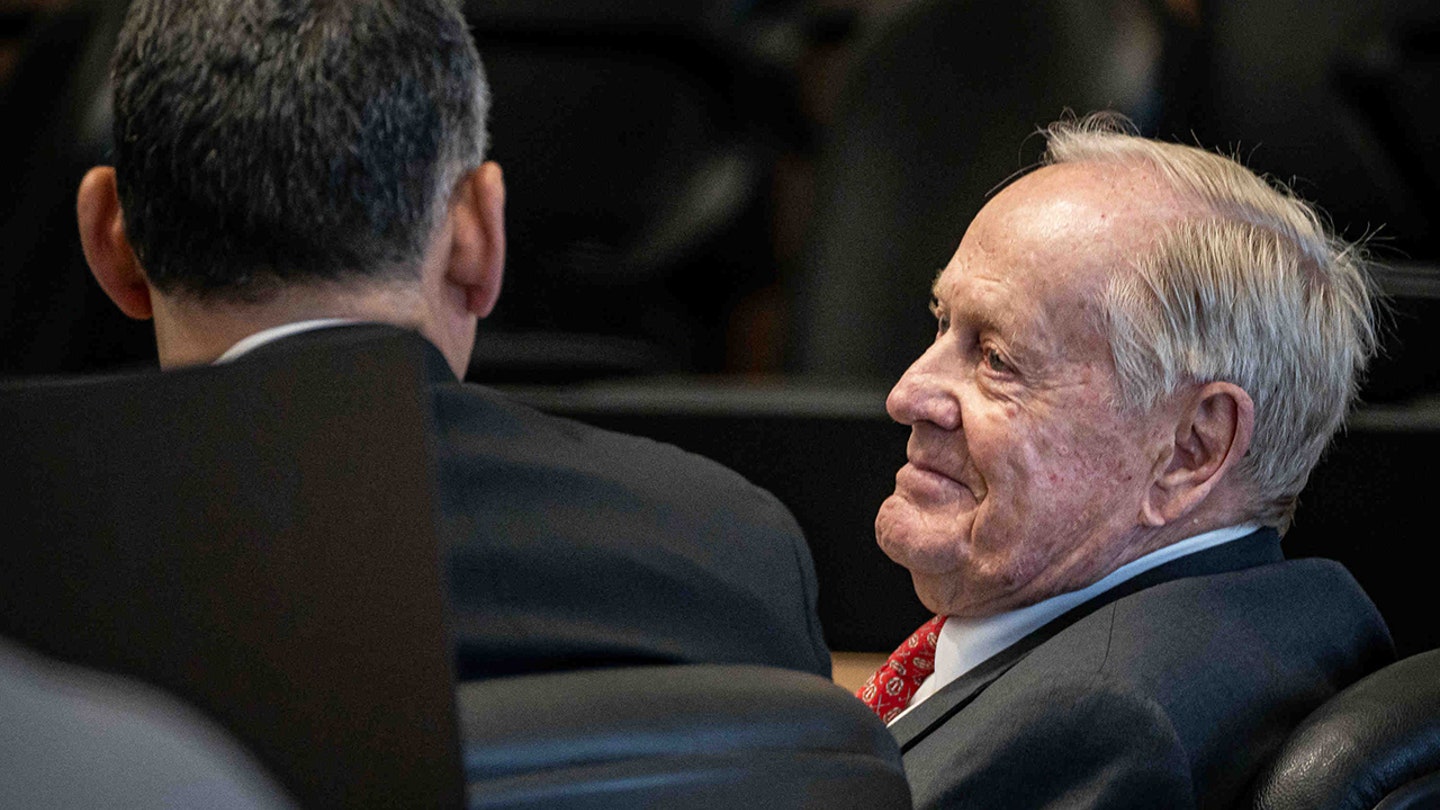Legal defense to 'Save Women's Sports' granted right to make argument to SCOTUS amid trans athlete dispute
Entities mentioned:
- Idaho Attorney General Raul Labrador: Justice, Determination, Competitive spirit
- Lindsay Hecox: Ambition, Self-respect, Freedom
- Supreme Court: Justice, Duty, Influence
- ACLU: Justice, Righteousness, Determination
Article Assessment:
Credibility Score: 75/100
Bias Rating: 55/100 (Center)
Sentiment Score: 45/100
Authoritarianism Risk: 30/100 (Generally Democratic)
Bias Analysis:
The article presents both sides of the argument, quoting from multiple perspectives. While it gives slightly more space to the 'Save Women's Sports' side, it maintains a relatively balanced approach overall.
Key metric: Gender Equality in Sports
Let me tell you something, folks - this legal battle is turning into a CHAMPIONSHIP SHOWDOWN! We've got Team Labrador stepping up to the plate, ready to swing for the fences in defense of women's sports. Meanwhile, Team Hecox is trying to pull a last-minute substitution, but the Supreme Court isn't calling a time-out just yet! This is a fourth-quarter play that could change the entire game plan for athletes across the nation. The stakes couldn't be higher as we head into overtime, with both sides showing true grit and determination. It's anyone's match at this point, and I'm telling you right now, this ruling could be the game-changer that defines the future of competitive sports!

Former ESPN employee says middle school daughter faced 'an obviously naturally born boy' in basketball game
Entities mentioned:
- Sam Ponder: Righteousness, Moral outrage, Determination
- Transgender Athletes: Recognition, Competitive spirit, Self-respect
- Donald Trump: Power, Control, Influence
- New York City: Unity, Freedom, Wariness
Article Assessment:
Credibility Score: 65/100
Bias Rating: 75/100 (Lean Right)
Sentiment Score: 30/100
Authoritarianism Risk: 55/100 (Mixed/Neutral)
Bias Analysis:
The article leans right, primarily quoting conservative voices and framing the issue from their perspective. It presents transgender participation in sports as problematic without offering counterarguments or scientific evidence.
Key metric: Gender Equality in Sports
Let me tell you something - this story is a GAME-CHANGER in the world of youth sports! Sam Ponder has stepped up to the plate, swinging for the fences on the hot-button issue of transgender athletes in girls' sports. She's not just talking the talk, folks - she's walking the walk as her own daughter faces this challenge on the court! This isn't just a pickup game we're talking about - it's a full-court press on the future of fair play in women's athletics! The ball is in New York City's court now, and they're playing defense without a playbook. Meanwhile, President Trump is running a full-court press with his executive order, but some states are pulling a fast break, dodging his defensive line. I'm telling you right now, this is the kind of fourth-quarter drama that could change the game for generations to come!

Chris 'The Bear' Fallica's Top 10 College Football Rankings: Week 9 Edition
Entities mentioned:
- Chris 'The Bear' Fallica: Professional pride, Recognition, Influence
- Ohio State: Competitive spirit, Ambition, Pride
- Indiana: Determination, Competitive spirit, Ambition
- Alabama: Competitive spirit, Pride, Legacy
- Texas A&M: Ambition, Competitive spirit, Determination
- Georgia: Competitive spirit, Pride, Determination
- Oregon: Competitive spirit, Ambition, Pride
- Miami: Competitive spirit, Ambition, Self-respect
- Notre Dame: Competitive spirit, Pride, Ambition
- Ole Miss: Competitive spirit, Ambition, Determination
- Vanderbilt: Ambition, Recognition, Competitive spirit
Article Assessment:
Credibility Score: 75/100
Bias Rating: 50/100 (Center)
Sentiment Score: 70/100
Authoritarianism Risk: 15/100 (Strongly Democratic)
Bias Analysis:
The article presents a balanced view of multiple teams' performances, giving credit where due. The author's expertise in sports betting adds credibility without showing favoritism to particular teams.
Key metric: College Football Playoff Rankings
Let me tell you something - this college football season is RIDICULOUS! We've got teams coming out of nowhere, powerhouses stumbling, and underdogs STEPPING UP TO THE PLATE like never before! The Bear's top 10 rankings are shaking things up, folks! Ohio State and Indiana are DOMINATING their conferences like well-oiled machines, while Alabama keeps GRINDING OUT WINS against top-ranked opponents. It's a FOURTH QUARTER FRENZY out there! Georgia's showing that CHAMPIONSHIP MENTALITY with their comeback wins, and Oregon's offense is RUNNING UP THE SCORE like it's nobody's business! But hold onto your hats, because Vanderbilt - yes, VANDERBILT - is making a Cinderella run that could land them in the CFP! This is the kind of COMPETITIVE FIRE that makes college football the greatest sport on earth! I'm telling you right now, every week is like a PLAYOFF GAME, and these teams are LEAVING IT ALL ON THE FIELD!

Robert Griffin III: Indiana is College Football's Best Team, Not Ohio State
Entities mentioned:
- Robert Griffin III: Recognition, Influence, Competitive spirit
- Ohio State: Competitive spirit, Pride, Legacy
- Indiana: Ambition, Competitive spirit, Recognition
- Fernando Mendoza: Ambition, Recognition, Competitive spirit
- Julian Sayin: Ambition, Recognition, Competitive spirit
Article Assessment:
Credibility Score: 75/100
Bias Rating: 50/100 (Center)
Sentiment Score: 70/100
Authoritarianism Risk: 20/100 (Strongly Democratic)
Bias Analysis:
The article presents balanced viewpoints, giving equal time to both Ohio State and Indiana's performances. It relies on expert analysis and statistical data, avoiding partisan language.
Key metric: College Football Rankings
Let me tell you something - this story is a GAME-CHANGER in the college football world! We've got a real David vs Goliath situation brewing here, folks! Indiana is coming out of nowhere like a rookie phenom, ready to take on the reigning champs Ohio State. It's fourth and inches, and the Hoosiers are going for it ALL! Robert Griffin III is playing the role of the bold analyst here, making a championship call that's got everyone talking. Fernando Mendoza? This kid's throwing touchdowns like he's playing backyard ball! And don't count out Julian Sayin - he's in the pocket, threading needles, and climbing the Heisman ladder faster than a wide receiver on a go route! This is the kind of competition that makes college football the greatest show on turf, and I'm telling you right now, we're heading for a photo finish in this race to the top!

Tim Tebow should be Florida's target for next head coach, ex-NFL star says
Entities mentioned:
- Tim Tebow: Legacy, Influence, Loyalty
- Florida Gators: Competitive spirit, Pride, Ambition
- Robert Griffin III: Recognition, Influence, Professional pride
- Scott Stricklin: Duty, Ambition, Determination
Article Assessment:
Credibility Score: 75/100
Bias Rating: 55/100 (Center)
Sentiment Score: 65/100
Authoritarianism Risk: 20/100 (Strongly Democratic)
Bias Analysis:
The article presents multiple viewpoints, including potential pros and cons of hiring Tebow. It balances enthusiasm for the idea with practical considerations, maintaining a relatively neutral stance.
Key metric: College Football National Rankings
Let me tell you something, folks - this is a GAME-CHANGING play for the Florida Gators! They're down in the fourth quarter of their program's history, and they need a Hail Mary pass to turn this ship around. Robert Griffin III is calling an audible here, folks, suggesting the Gators bring in their legendary quarterback Tim Tebow as head coach. This is the kind of fourth quarter strategy that could put Florida back in the national championship conversation! Tebow's got that championship DNA, and if he steps up to the plate, he could knock it out of the park for Florida's recruiting game. But make no mistake, coaching is a whole different ballgame, and Tebow would need to assemble an all-star coaching staff to have a shot at the title. This is a high-risk, high-reward play that could either be a slam dunk or a fumble at the goal line for the Gators' program!

WWE World Heavyweight Championship vacated due to Seth Rollins injury, title match set between top stars
Entities mentioned:
- Seth Rollins: Competitive spirit, Pride, Determination
- Adam Pearce: Control, Duty, Professional pride
- Jey Uso: Ambition, Competitive spirit, Self-preservation
- CM Punk: Ambition, Competitive spirit, Legacy
- The Vision: Power, Control, Influence
Article Assessment:
Credibility Score: 75/100
Bias Rating: 50/100 (Center)
Sentiment Score: 65/100
Authoritarianism Risk: 30/100 (Generally Democratic)
Bias Analysis:
The article presents a balanced view of events, giving equal attention to various wrestlers and storylines. It doesn't favor any particular performer or narrative, maintaining a neutral stance typical of sports reporting.
Key metric: WWE Viewership and Fan Engagement
Let me tell you something, folks - this is a GAME-CHANGER in the WWE universe! The injury to Seth Rollins has thrown the whole championship picture into CHAOS, and we're seeing a real free-for-all as these superstars fight for their shot at glory. It's like we're in sudden death overtime, with Adam Pearce playing the role of head coach, making the tough calls from the sidelines. Jey Uso has stepped up to the plate in a BIG WAY, showing that championship mentality by eliminating his own brother - talk about a power play! Meanwhile, CM Punk is like a veteran quarterback, calm under pressure and ready to lead his team to victory. But don't count out The Vision - they're like that underdog team that everyone overlooks until they're suddenly in the playoffs. This is the kind of fourth-quarter drama that keeps fans on the edge of their seats, and I'm telling you right now, the road to Saturday Night's Main Event is going to be one for the history books!

US Olympic medalists MyKayla Skinner and Nancy Hogsead join activist sportswear brand XX-XY Athletics
Entities mentioned:
- MyKayla Skinner: Justice, Determination, Professional pride
- Nancy Hogshead: Justice, Influence, Legacy
- XX-XY Athletics: Competitive spirit, Justice, Influence
- Simone Biles: Loyalty, Influence, Recognition
- Riley Gaines: Justice, Competitive spirit, Determination
Article Assessment:
Credibility Score: 75/100
Bias Rating: 70/100 (Lean Right)
Sentiment Score: 65/100
Authoritarianism Risk: 35/100 (Generally Democratic)
Bias Analysis:
The article leans right due to its framing of transgender athletes as a threat to women's sports. It primarily presents perspectives from those opposed to transgender participation, with minimal counter-arguments.
Key metric: Women's Sports Participation Rate
Let me tell you something, folks - this is a GAME-CHANGER in the world of women's athletics! We're seeing a major power play unfold as Olympic heavyweights MyKayla Skinner and Nancy Hogshead join forces with XX-XY Athletics. This dream team is stepping up to the plate, ready to go to bat for women's sports! They're not just talking the talk, they're walking the walk, putting on their game faces to tackle the hot-button issue of transgender athletes in women's sports. It's like we're watching a high-stakes championship match, with these decorated Olympians bringing their A-game to level the playing field. Skinner and Hogshead are showing true championship mentality, refusing to sit on the sidelines while the rules of the game are being rewritten. This is a fourth-quarter move that could change the entire landscape of women's athletics. I'm telling you right now, the competition is heating up, and these athletes are pulling no punches in their fight for fair play!

USA vs. China: How to Watch, Women's U-17 Preview
Entities mentioned:
- United States U-17 Women's Soccer Team: Competitive spirit, Pride, Legacy
- China U-17 Women's Soccer Team: Determination, Ambition, Recognition
- FIFA: Professional pride, Control, Influence
Article Assessment:
Credibility Score: 85/100
Bias Rating: 55/100 (Center)
Sentiment Score: 70/100
Authoritarianism Risk: 15/100 (Strongly Democratic)
Bias Analysis:
The article presents a balanced view of both teams, providing equal information about their recent performances. There's a slight lean towards U.S. coverage, but it's minimal given the likely U.S. audience.
Key metric: USA Women's Soccer International Competitiveness
Let me tell you something - this match is HUGE for our young American squad! The U.S. team is stepping up to the plate with a championship mentality after dominating Ecuador 3-0. But folks, don't count out China! They're coming in hot off a 5-0 blowout against Norway. This is a clash of titans in the making! The USA needs to bring their A-game and leave it all on the field if they want to secure their spot at the top of the group. It's fourth quarter time in the group stage, and every goal counts. I'm telling you right now, this match could be the difference between advancing to the knockout rounds or an early flight home. The pressure is on, and we'll see which team has the mental toughness to come out on top!

Jack Nicklaus wins $50 million in defamation case against former company
Entities mentioned:
- Jack Nicklaus: Legacy, Loyalty, Self-respect
- Nicklaus Companies: Control, Greed, Power
- Howard Milstein: Power, Control, Influence
- PGA Tour: Self-preservation, Loyalty, Legacy
- LIV Golf: Competitive spirit, Ambition, Influence
Article Assessment:
Credibility Score: 75/100
Bias Rating: 55/100 (Center)
Sentiment Score: 65/100
Authoritarianism Risk: 20/100 (Strongly Democratic)
Bias Analysis:
The article presents facts from multiple sources and includes quotes from both sides. While it leans slightly favorable towards Nicklaus, it maintains a relatively balanced perspective on the legal proceedings.
Key metric: Professional Sports Integrity
Let me tell you something - this story is RIDICULOUS! We've got a true GOAT of golf, Jack Nicklaus, stepping up to the plate and absolutely CRUSHING it in the courtroom! This isn't just a win, folks, this is a GRAND SLAM victory against his former team that tried to throw him under the bus. Nicklaus showed us he's still got that championship mentality, proving he can dominate not just on the greens, but in the legal arena too. His former company tried to paint him as past his prime, but Nicklaus came out swinging, demonstrating the kind of clutch performance that made him a legend. This $50 million judgment? That's like sinking an eagle putt on the 18th hole to clinch the Masters. Nicklaus has always been a team player for the PGA Tour, and he wasn't about to let anyone accuse him of selling out to a rival league. This is a fourth-quarter comeback for the ages, solidifying Nicklaus's legacy both on and off the course!

The NBA is at its international peak, but British players are still struggling to break through
Entities mentioned:
- NBA: Competitive spirit, Recognition, Influence
- Amari Williams: Ambition, Determination, Recognition
- Boston Celtics: Competitive spirit, Legacy, Pride
- Tosan Evbuomwan: Ambition, Determination, Professional pride
- British Basketball Federation: Control, Self-preservation, Obligation
Article Assessment:
Credibility Score: 85/100
Bias Rating: 50/100 (Center)
Sentiment Score: 45/100
Authoritarianism Risk: 20/100 (Strongly Democratic)
Bias Analysis:
The article presents a balanced view of the situation, giving voice to multiple perspectives. It relies on factual information and direct quotes from relevant sources without pushing a particular agenda.
Key metric: International Player Development
Let me tell you something - this story is a GAME-CHANGER for British basketball! The NBA's international roster is EXPLODING like a fourth-quarter scoring run, but British players are still warming the bench. Amari Williams and Tosan Evbuomwan are stepping up to the plate, trying to hit a home run for UK hoops. But folks, the British basketball system is playing defense against itself! With a governance crisis that's got them fumbling the ball, they're struggling to even stay on the court. The UK government and NBA are tag-teaming with a £10 million assist, but will it be enough to turn this game around? I'm telling you right now, British basketball needs a championship mentality to compete on the global stage. They've got the raw talent, but without the proper training facilities and development pipeline, they're like a team without a playbook. It's RIDICULOUS that these athletes have to create their own plays just to get in the game! The clock is ticking, and if British basketball doesn't make some clutch moves soon, they might find themselves watching from the sidelines as the rest of the world dominates the hardwood!